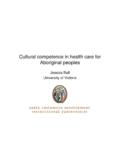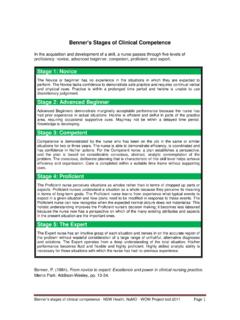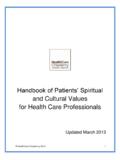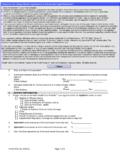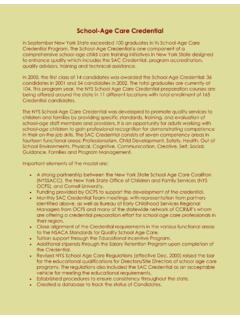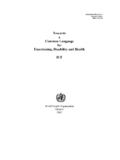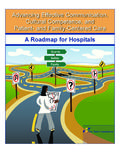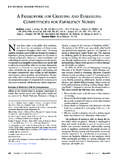Transcription of WHO/MNH/MND/96.9 MENTAL HEALTH CARE …
1 WHO/MNH/ HEALTH care LAW: TEN BASICPRINCIPLES with Annotations Suggesting Selected Actions to Promote their ImplementationThis is an edited version of a WHO document which lists and describes ten basic principles ofmental HEALTH care law. It also provides annotations for their implementation in WORDS: HEALTH legislation / MENTAL HEALTH / MENTAL HEALTH care / human document is not a formal publication of the World HEALTH Organization (WHO), and allrights are reserved by the organization. The document may, however, be freely reviewed,abstracted, reproduced or translated, in part or in whole, but not for sale or for use in conjunctionwith commercial of MENTAL HEALTH and Prevention of Substance AbuseWorld HEALTH OrganizationGeneva, 1996 TABLE OF CONTENTSF oreword1. Promotion of MENTAL HEALTH and Prevention of MENTAL Disorders2. Access to Basic MENTAL HEALTH Care3. MENTAL HEALTH Assessments in Accordance with Internationally Accepted Principles4. Provision of the Least Restrictive Type of MENTAL HEALTH Care5.
2 Self-Determination6. Right to be Assisted in the Exercise of Self-Determination7. Availability of Review Procedure8. Automatic Periodical Review Mechanism9. Qualified Decision-Maker10. Respect of the Rule of LawFOREWORDThis WHO reference document lists and describes ten basic principles of MENTAL HEALTH care also provides annotations for their implementation in is largely inspired from a comparative analysis of national MENTAL HEALTH laws in a selection of45 countries worldwide conducted by WHO in recent years. Also, this selection of principlesdraws from the principles for the Protection of Persons with MENTAL Illness and the Improvementof MENTAL HEALTH care adopted by UN General Assembly Resolution 46/119 of 17 December1991 (hereafter referred to as "UN principles ").This instrument was primarily produced to address a need frequently and insistently expressedby Member States, experts and other interested parties. It consists of a straightforward account ofkey reference principles and implementation tips.
3 The instrument aims to depict basic legalprinciples for the field of MENTAL HEALTH with as little influence as possible from given cultures orlegal traditions. Embodiment of these principles into the legal body of a jurisdiction in a format,structure and language that suit local requirements is best handled on an ad hoc basis by result is by no means a model act. It does not exhaust the relevant principles specificallyapplicable to MENTAL HEALTH care . Further, it is subordinated to more general principles generallyapplicable to HEALTH care at large, such as that of a result, it is meant to be considered by individuals in an official ( lawmakers, publichealth managers, MENTAL HEALTH care providers) or private ( persons with MENTAL disorders,family members, MENTAL HEALTH advocates) acknowledgments are owed to the National Institute of MENTAL HEALTH (USA) for itsimportant contribution which made possible the development of the project of which thisdocument is an are also grateful to the Department of HEALTH (UK), to the Foreign and CommonwealthOffice (UK), to the Ministry of Justice (The Netherlands), to Friends of Switzerland (Boston)and to Swissair (Boston) for their respective generous contributions to the completion of projectswhich have led to the production of this J.
4 A. Costa e Silva, Director, Division of MENTAL HEALTH and Prevention of Substance Abuse1. Promotion of MENTAL HEALTH and Prevention of MENTAL DisordersDescriptionEveryone should benefit from the best possible measures to promote their MENTAL well-being andto prevent MENTAL principle includes the following components:1. MENTAL HEALTH promotion efforts;2. MENTAL disorders prevention actions suggested to promote this principle include:1. Promoting behaviours which contribute to enhancing and maintaining MENTAL Identifying and taking appropriate actions to eliminate the causes of MENTAL Access to Basic MENTAL HEALTH CareDescriptionEveryone in need should have access to basic MENTAL HEALTH principle includes the following components:1. MENTAL HEALTH care should be of adequate quality, :a. preserve the dignity of the patient;b. take into consideration and allow for techniques which help patients to cope bythemselves with their MENTAL HEALTH impairments, disabilities and handicaps;c.
5 Provide accepted and relevant clinical and nonclinical care aimed at reducing theimpact of the disorder and improving the quality of life of the patient;d. maintain a MENTAL HEALTH care system of adequate quality (including primaryhealth care , outpatient, inpatient and residential facilities);2. Access to MENTAL HEALTH care should be affordable and equitable;3. MENTAL HEALTH care should be geographically accessible;4. MENTAL HEALTH care should be available on a voluntary basis, as HEALTH care in general;5. Access to HEALTH care , including MENTAL HEALTH care , is contingent upon the availablehuman and logistical actions suggested to promote this principle are:1. Having a specific provision in the law which guarantees quality HEALTH care , preferably ageneral provision on HEALTH care applying to MENTAL HEALTH by extension;2. Having medical practices in keeping with quality assurance guidelines such as thosedeveloped by WHO;3. Havingdeveloped and/or adapted at national level quality assurance guidelines andinstruments by and for all qualified professionals or governmental bodies;4.
6 Offering MENTAL HEALTH care which is culturally appropriate;5. Calling for and taking into consideration the patient's assessment of the quality of care ;6. Having treatments, decisions and measures regarding a person to whom MENTAL healthcare is provided, documented in the person's medical record;7. Introducing a MENTAL HEALTH component into Primary HEALTH care ;8. Promoting HEALTH insurance programs (public or private) offering coverage to the widestpossible number of individuals and which do not exclude but specifically include mentalhealth care ;9. Having a voluntary admission procedure incorporated into the MENTAL HEALTH law schemewhich is abided by in practice;10. Having MENTAL HEALTH care geographically "accessible" according to WHO's indications, :a. by making basic MENTAL HEALTH care available within one hour walking ortravelling distance; andb. by making available the essential drugs identified by WHO (or drugs of the samefamily with similar properties: amitriptyline, biperiden, carbamazepine,chlorpromazine, clomipramine, diazepam, fenobarbitone, fluphenazine decanoate,haloperidol, imipramine, lithium carbonate and temazepam).
7 3. MENTAL HEALTH Assessments in Accordance with Internationally AcceptedPrinciplesDescriptionMental HEALTH assessments should be made in accordance with internationally accepted medicalprinciples and instruments ( : WHO's ICD-10 Classification of MENTAL and BehaviouralDisorders - Clinical Descriptions and Diagnostic Guidelines, Tenth Revision, 1992).ComponentsThis principle includes the following components:1. MENTAL HEALTH assessments include:a. diagnosis;b. choice of a treatment;c. determination of competence;d. determination that someone may cause harm to self or others due to a mentaldisorder;2. MENTAL HEALTH assessments should only be conducted for purposes directly relating tomental illness or the consequences of MENTAL actions suggested to promote this principle are:1. Promoting clinical training in the use of internationally accepted principles ;2. Refraining from referring to nonclinical criteria, such as political, economic, social, racialand religious grounds when assessing potential to cause harm to self or others;3.
8 Performing complete reassessments each time a new assessment is conducted;4. Refraining from basing an assessment only on past medical history of MENTAL Provision of the Least Restrictive Type of MENTAL HEALTH CareDescriptionPersons with MENTAL HEALTH disorders should be provided with HEALTH care which is the principle includes the following components:1. Items to be considered in the selection of least restrictive alternatives include:a. the disorder involved;b. the available treatments;c. the person's level of autonomy;d. the person's acceptance and cooperation; ande. the potential that harm be caused to self or others;2. Community-based treatment should be made available to qualifying patients;3. Institution-based treatments should be provided in the least restrictive environment andtreatments involving the use of physical ( isolation rooms, camisoles) and chemicalrestraints, if at all necessary, should be contingent upon:a. sustained attempts to discuss alternatives with the patient;b.
9 Examination and prescription by an approved HEALTH care provider;c. the necessity to avoid immediate harm to self or others;d. regular observation;e. periodical reassessments of the need for restraint ( every half hour for physicalrestraint);f. a strictly limited duration ( 4 hours for physical restraint);g. documentation in patient's medical actions suggested to promote this principle are:1. Maintaining legal instruments and infrastructures (human resources, sites, etc.) to supportcommunity-based MENTAL HEALTH care involving settings for patients with various degreesof autonomy;2. Taking steps to eliminate isolation rooms and prohibit the creation of new ones;3. Amending relevant legal instruments to remove provisions incompatible withcommunity-based MENTAL HEALTH care ;4. Training MENTAL HEALTH care providers in the use of alternatives to the traditional restraintsto deal with crisis Self-DeterminationDescriptionConsent is required before any type of interference with a person can principle includes the following components:1.
10 Interference includes:a. bodily and MENTAL integrity ( diagnostic procedures, medical treatment, such asuse of drugs, electroconvulsive therapy and irreversible surgery);b. liberty ( mandatory commitment to hospital).2. Consent must be:a. given by the person involved, as may apply in keeping with cultures, after havingobtained advice from any traditional decision-making unit ( family, relative,work unit);b. free (of undue influence);c. informed (information to be accurate, understandable, sufficient for one to advantages, disadvantages, risks, alternatives, expected results, side-effects);d. documented in the patient's medical file, except for minor In case a person with a MENTAL disorder is found to be unable to consent, which willtypically be the case occasionally but not systematically, there should be a surrogatedecision-maker (relative, friend or authority) authorized to decide on the patient's behalfand in the patient's best interest. Parents or guardians, if any, are to give consent actions suggested to promote this principle are:1.










